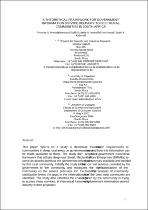 ResearchSpace
ResearchSpace
Theoretical framework for government information service delivery to deep rural communities in South Africa
JavaScript is disabled for your browser. Some features of this site may not work without it.
- ResearchSpace
- →
- Research Publications/Outputs
- →
- Conference Publications
- →
- View Item
| dc.contributor.author |
Mvelase, PS

|
|
| dc.contributor.author |
Dlodlo, N

|
|
| dc.contributor.author |
Mathaba, SU

|
|
| dc.contributor.author |
Krause, C

|
|
| dc.contributor.author |
Kabanda, SK

|
|
| dc.date.accessioned | 2009-11-19T07:11:57Z | |
| dc.date.available | 2009-11-19T07:11:57Z | |
| dc.date.issued | 2009-10 | |
| dc.identifier.citation | Mvelase, PS, Dlodlo, N, Mathaba, SU et al. 2009. Theoretical framework for government information service delivery to deep rural communities in South Africa. 3rd International IDIA Development Informatics Conference. Kruger National Park, South Africa, 28-30 October 2009, pp 297-309 | en |
| dc.identifier.isbn | 978-0-620-45037-9 | |
| dc.identifier.uri | http://hdl.handle.net/10204/3752 | |
| dc.description | This is the author's version of the work. The definitive version was published in the Proceedings of the 3rd International IDIA Development Informatics Conference, pp 297-309 | en |
| dc.description.abstract | This paper reports on a study to determine the information requirements of communities in deep rural areas on government services and how this information can be made available to them. The study then proposes an e-government theoretical framework that utilizes deep rural Small, Medium and Micro Enterprises (SMMEs) to serve as access points to the government information on services available and needed by this rural community. Initially the study identifies current services provided by the government to the community and measures the levels of satisfaction of the community on the service provision. On the basis of the analysis of community satisfaction levels the gaps in the information needs of the deep rural community are identified. The study also identifies the challenges faced by the community in trying to access these services. A theoretical framework for government information service delivery is then proposed. This research was conducted as a case study at KwaNongoma rural area in KwaZulu-Natal, to come up with the community needs, recreation needs of three communities of KwaKhangela, KwaMememe and KwaSomkhele were identified. The community needs determination covered electricity, water, education, housing, financing and health to name but a few. | en |
| dc.language.iso | en | en |
| dc.subject | E-government | en |
| dc.subject | Deep rural communities | en |
| dc.subject | SMMEs | en |
| dc.subject | Government information services delivery | en |
| dc.subject | Service delivery framework | en |
| dc.subject | Small sized enterprises | en |
| dc.subject | 3rd International IDIA Development Informatics Conference | en |
| dc.subject | Medium sized enterprises | en |
| dc.title | Theoretical framework for government information service delivery to deep rural communities in South Africa | en |
| dc.type | Conference Presentation | en |
| dc.identifier.apacitation | Mvelase, P., Dlodlo, N., Mathaba, S., Krause, C., & Kabanda, S. (2009). Theoretical framework for government information service delivery to deep rural communities in South Africa. http://hdl.handle.net/10204/3752 | en_ZA |
| dc.identifier.chicagocitation | Mvelase, PS, N Dlodlo, SU Mathaba, C Krause, and SK Kabanda. "Theoretical framework for government information service delivery to deep rural communities in South Africa." (2009): http://hdl.handle.net/10204/3752 | en_ZA |
| dc.identifier.vancouvercitation | Mvelase P, Dlodlo N, Mathaba S, Krause C, Kabanda S, Theoretical framework for government information service delivery to deep rural communities in South Africa; 2009. http://hdl.handle.net/10204/3752 . | en_ZA |
| dc.identifier.ris | TY - Conference Presentation AU - Mvelase, PS AU - Dlodlo, N AU - Mathaba, SU AU - Krause, C AU - Kabanda, SK AB - This paper reports on a study to determine the information requirements of communities in deep rural areas on government services and how this information can be made available to them. The study then proposes an e-government theoretical framework that utilizes deep rural Small, Medium and Micro Enterprises (SMMEs) to serve as access points to the government information on services available and needed by this rural community. Initially the study identifies current services provided by the government to the community and measures the levels of satisfaction of the community on the service provision. On the basis of the analysis of community satisfaction levels the gaps in the information needs of the deep rural community are identified. The study also identifies the challenges faced by the community in trying to access these services. A theoretical framework for government information service delivery is then proposed. This research was conducted as a case study at KwaNongoma rural area in KwaZulu-Natal, to come up with the community needs, recreation needs of three communities of KwaKhangela, KwaMememe and KwaSomkhele were identified. The community needs determination covered electricity, water, education, housing, financing and health to name but a few. DA - 2009-10 DB - ResearchSpace DP - CSIR KW - E-government KW - Deep rural communities KW - SMMEs KW - Government information services delivery KW - Service delivery framework KW - Small sized enterprises KW - 3rd International IDIA Development Informatics Conference KW - Medium sized enterprises LK - https://researchspace.csir.co.za PY - 2009 SM - 978-0-620-45037-9 T1 - Theoretical framework for government information service delivery to deep rural communities in South Africa TI - Theoretical framework for government information service delivery to deep rural communities in South Africa UR - http://hdl.handle.net/10204/3752 ER - | en_ZA |





